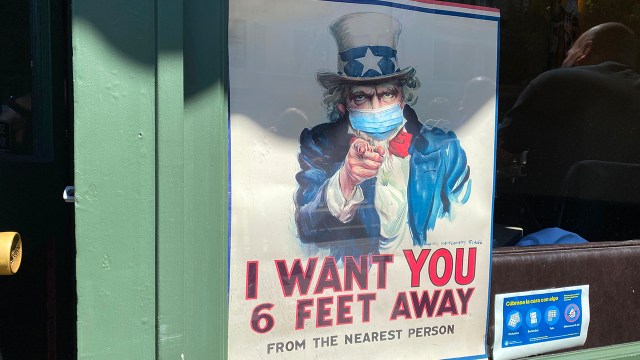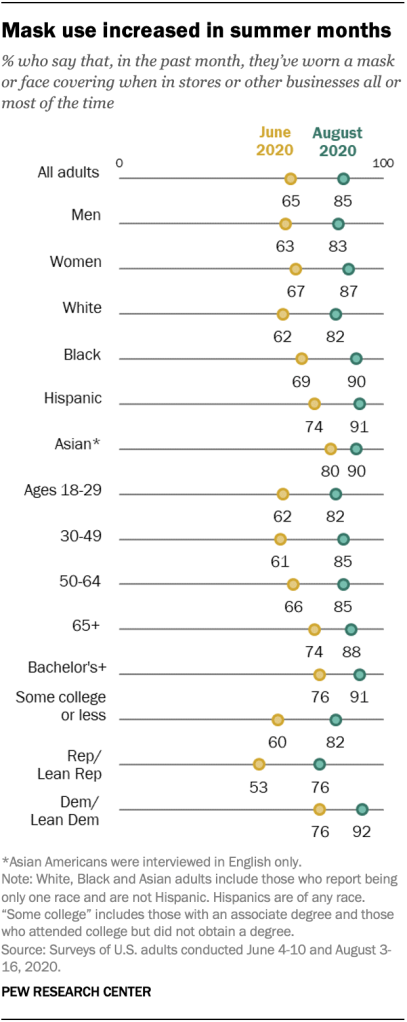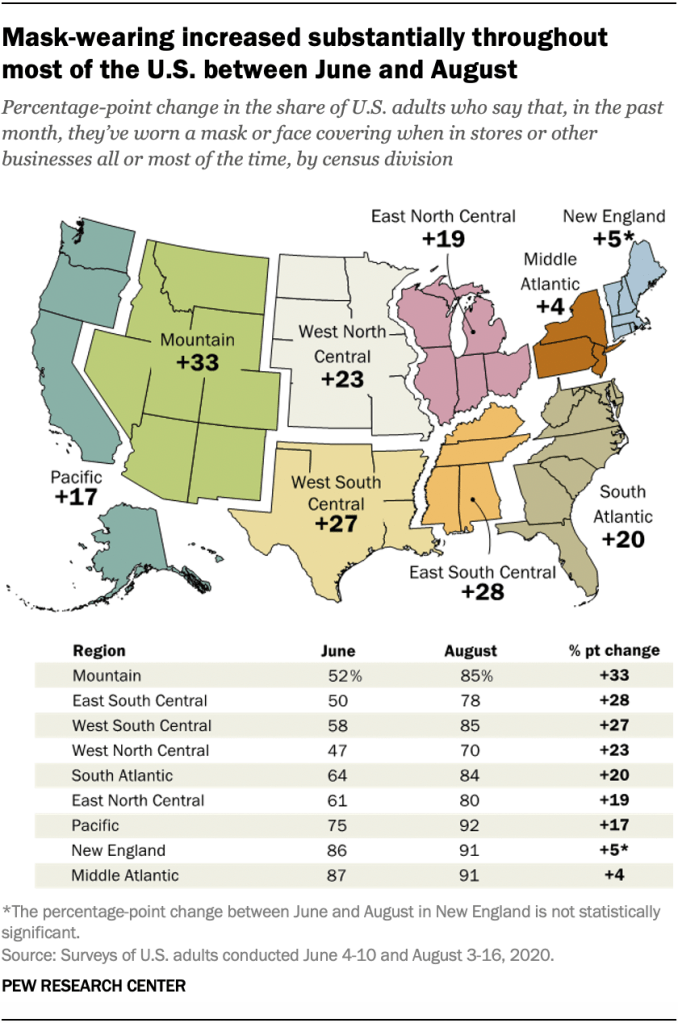
As the coronavirus pandemic continues, a growing share of Americans say they are regularly wearing a mask or face covering in stores and other businesses. More than eight-in-ten U.S. adults (85%) say they have done so all or most of the time over the past month, according to a Pew Research Center survey conducted Aug. 3 to 16. When asked the same question in early June, 65% of Americans said they had been regularly wearing masks.
The partisan divide has narrowed during this period, and solid majorities in both party coalitions now report regularly wearing masks. In the new survey, 92% of Democrats and those who lean toward the Democratic Party say they usually wear masks in stores and other businesses, as do 76% of Republicans and GOP leaners. In June, 76% of Democrats said they had usually worn masks in stores and other businesses over the past month, compared with a little over half of Republicans and GOP leaners (53%). The partisan gap is now 16 percentage points, down from 23 points this spring.
The narrowing partisan gap comes as the number of coronavirus cases has spiked far beyond the major metro areas that saw high infection rates and fatality counts earlier in the crisis. As rapidly growing case counts strained health care systems across the South and Southwest this summer, more Republican leaders ordered citizens to wear masks to help slow the spread of the virus. In July, President Donald Trump wore a mask in public for the first time and urged Americans to do the same, marking a change in tone from earlier in the pandemic.
In the new survey, 82% of adults under age 30 say they regularly wear a mask – up 20 percentage points since June, when 62% said they did so. The youngest adults are now nearly on par with those ages 65 and older, 88% of whom say they have usually worn masks to stores over the past month as of mid-August, up from 74% in the spring.
Pew Research Center conducted this study to understand Americans’ personal mask-wearing behavior during the nationwide coronavirus outbreak. The data was collected as a part of larger surveys conducted June 4 to 10 and Aug. 3 to 16, 2020. Everyone who took part in these surveys is a member of Pew Research Center’s American Trends Panel (ATP), an online survey panel that is recruited through national, random sampling of residential addresses. This way nearly all U.S. adults have a chance of selection. The survey is weighted to be representative of the U.S. adult population by gender, race, ethnicity, partisan affiliation, education and other categories. Read more about the ATP’s methodology.
Here are the questions used for this analysis, along with responses, and its methodology.
Americans with college degrees remain more likely to wear a mask than those without a degree (91% vs. 82%), though this gap has also shrunk since June (76% vs. 60%).
Other demographic patterns have remained relatively consistent between June and August. For example, women have consistently reported wearing masks at slightly higher rates than men (87% vs. 83% in August, compared with 67% vs. 63% in June).
Meanwhile, White Americans (82%) still lag behind their Black (90%), Hispanic (91%) and Asian (90%) counterparts when it comes to regularly wearing masks in stores and other businesses. That was also the case in June, when 62% of White adults reported regularly wearing masks, compared with 69% of Black, 74% of Hispanic and 80% of Asian adults.
As the coronavirus outbreak has spread to new parts of the country, mask use has increased in some regions more than others. In the Mountain region – which includes states like Arizona, New Mexico and Montana – regular mask use rose from 52% of adults to 85% in only two months. The East and West South Central regions, which cover states from Texas to Kentucky, also saw large numbers of people adopting a mask-wearing habit during this period. By comparison, there was little or no change in the share of adults who say they regularly wear a mask in the New England and Middle Atlantic regions, where mask-wearing was already standard practice in early June.
Large majorities of adults in every region of the country now say they usually wear masks in stores and other business, according to the new survey. Mask-wearing is least common in the West North Central region, which covers states like Missouri, Kansas and Minnesota. But even in this region, 70% of adults still say they wear masks regularly in stores and other businesses, up from 47% in June.
Note: Here are the questions used for this analysis, along with responses, and its methodology.
CORRECTION (October 2020): The methodology section has been updated to reflect the correct cumulative response rate. None of the study findings or conclusions were affected.


